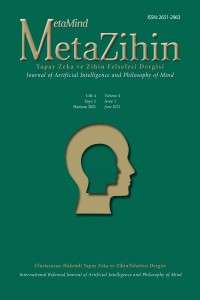Abstract
Thought experiments have long been utilized in science and philosophy. They come in various forms, from Schrödinger's cat in physics to the Chinese room argument in philosophy. Although thought experiments are used widely, scant attention has been paid to how thought experiments actually work. In philosophy literature, it has been argued that thought experiments are a disguised form of meaning analysis. Thought experiments rely on the notion of analyticity on their basis, and therefore they should be abandoned. In this paper, I argue that if we distinguish conceivability type thought experiments commonly found in philosophy from factive thought experiments widely used in science, a viable methodological alternative can be found. I propose a set of criteria to define factive thought experiments precisely. I show how factive thought experiments can be successfully used in philosophical reasoning by giving examples, mainly from Wittgenstein's work. In this way, I argue, it is possible to naturalize thought experimentation.
References
- Ayer, A. J. (1952). Language, Truth and Logic. New York: Dover.
- Gendler, T. S. (2000). Thought Experiment: On the Powers and Limits of Imaginary Cases. NY: Garland Press.
- Gendler, T. S. (2002). "Thought Experiment." In Encyclopedia of Cognitive Science. NY/London: Nature/Routledge.
- Gendler, T. S. (2004). “Thought Experiments Rethought—And Reperceived.” Philosophy of Science, 71(5): 1152–1163. https://doi.org/10.1086/425239
- Jackson, F. (1982). “Epiphenomenal Qualia.” Philosophical Quarterly, 32: 127–136.
- Kuhn, T. (1964). "A Function for Thought Experiments." Reprinted in The Essential Tension: Selected Studies in Scientific Tradition and Change (1977) (pp. 240-265). University of Chicago Press.
- Kuhn, T. (1977). The Essential Tension. Chicago: University of Chicago Press.
- Massey, G. (1991). "Backdoor Analyticity." In Horowitz, T. and G. Massey (Eds.), Thought Experiments in Science and Philosophy (pp. 285-296). Savage, MD: Rowman and Littlefield.
- Sorensen, R. (1992). Thought Experiments. New York: Oxford University Press.
- Wittgenstein, L. (1999). Philosophical Investigations. Oxford: Blackwell.
- Wittgenstein, L. (1972). On Certainty. New York: Harper Torch Books.
Abstract
Düşünce deneyleri uzun zamandır bilim ve felsefede kullanılıyor. Fizikte Schrödinger’in kedisinden felsefede Çince odası argümanına kadar birçok farklı yerde ve şekilde bulunabiliyorlar. Düşünce deneylerinin bu kadar sık kullanılmasına rağmen, düşünce deneylerinin nasıl çalıştığına çok az dikkat edilmiştir. Felsefe literatüründe, düşünce deneylerinin anlam analizinin kılık değiştirmiş formu olduğunu savunan görüşler mevcuttur. Bu görüşlere göre, düşünce deneyleri temelde analitik nosyonlara dayanmaktır ve bu yüzden terk edilmelidir. Bu makalede, eğer genelde felsefede bulunan kavranabilirliğe dayanan düşünce deneylerini genelde bilimde kullanılan olgusal düşünce deneylerinden ayırırsak kullanışlı bir metodolojik alternatifin bulanabileceğini savunuyorum. Olgusal düşünce deneylerini daha net olarak tanımlamak için bir grup kriter sunuyorum. Olgusal düşünce deneylerinin felsefede nasıl kullanılabileceğini göstermek için özellikle Wittgenstein’ın çalışmalarından örnekler veriyorum. Bu şekilde, düşünce deneylerinin doğallaştırılabileceğini savunuyorum.
Thanks
Bu çalışma Bilim Akademisi tarafından sağlanan BAGEP Ödülü ile desteklenmiştir.
References
- Ayer, A. J. (1952). Language, Truth and Logic. New York: Dover.
- Gendler, T. S. (2000). Thought Experiment: On the Powers and Limits of Imaginary Cases. NY: Garland Press.
- Gendler, T. S. (2002). "Thought Experiment." In Encyclopedia of Cognitive Science. NY/London: Nature/Routledge.
- Gendler, T. S. (2004). “Thought Experiments Rethought—And Reperceived.” Philosophy of Science, 71(5): 1152–1163. https://doi.org/10.1086/425239
- Jackson, F. (1982). “Epiphenomenal Qualia.” Philosophical Quarterly, 32: 127–136.
- Kuhn, T. (1964). "A Function for Thought Experiments." Reprinted in The Essential Tension: Selected Studies in Scientific Tradition and Change (1977) (pp. 240-265). University of Chicago Press.
- Kuhn, T. (1977). The Essential Tension. Chicago: University of Chicago Press.
- Massey, G. (1991). "Backdoor Analyticity." In Horowitz, T. and G. Massey (Eds.), Thought Experiments in Science and Philosophy (pp. 285-296). Savage, MD: Rowman and Littlefield.
- Sorensen, R. (1992). Thought Experiments. New York: Oxford University Press.
- Wittgenstein, L. (1999). Philosophical Investigations. Oxford: Blackwell.
- Wittgenstein, L. (1972). On Certainty. New York: Harper Torch Books.
Details
| Primary Language | English |
|---|---|
| Subjects | Philosophy |
| Journal Section | Research/Review Articles |
| Authors | |
| Publication Date | June 30, 2021 |
| Acceptance Date | June 27, 2021 |
| Published in Issue | Year 2021 Volume: 4 Issue: 1 |

